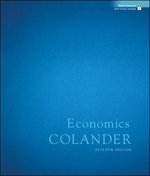Question
QUESTION1 1.Which of the followingstatementsisFALSE? A. When the U.S. permanently increases its government spending, it is ambiguous whether our trade partner Japan would experience an
QUESTION1
1.Which of the followingstatementsisFALSE?
A. When the U.S. permanently increases its government spending, it is ambiguous whether our trade partner Japan would experience an increase in aggregate demand and output in the short-run.
B. Comparing fixed to flexible exchange rate, the response of an economy to a temporary rise in foreign demand for its exports is that output actually increases less under floating rate than under fixed rate.
C. The internationalization of banking has weakened national safeguards against banking collapse, but at the same time it has made the need for effective safeguards more urgent.
D. A portfolio that contains two stocks whose (expected) return correlation is zero is better diversified than the one consisting of two stocks whose (expected) return correlation is positive.
QUESTION 2
The PPP theory fails in reality for all of the following reasons EXCEPT
A.implicit and explicit restrictions on trade.
B.transport costs.
C.inflation rates are unrelated to money supply growth.
D.monopolistic or oligopolistic practices in goods markets.
E.the inflation data reported in different countries are based on different commodity baskets.
QUESTION 3
If a country chooses to have a monetary policy oriented toward domestic goals and a fixed exchange rate, then
A.it cannot have fiscal policy oriented toward domestic goals.
B.it can have the freedom of international capital movements.
C.it cannot have the freedom of international capital movements.
D.it cannot control money supply growth.
E.it cannot balance its current account.
QUESTION 4
- Under fixed exchange rates, which one of the following statements is the MOST accurate?
A.Devaluation causes a rise in output, a rise in official reserves, and an expansion of the money supply.
B.Devaluation causes a fall in output and a rise in official reserves.
C.Devaluation causes an expansion of the money supply but an ambiguous effect on output.
D.Devaluation causes a fall in official reserves, and an expansion of the money supply.
E.Devaluation causes a decrease in output, a decrease in official reserves, and an expansion of the money supply.
QUESTION 5
You travel to Paris and pay for a $100 dinner with your credit card. How is thislast transactionpayment of $100 out of U.S. credit cardaccounted for in theU.S.balance of payments?
A.current account, U.S. good export
B.financial account, U.S. asset export
C.financial account, U.S. asset import
D.financial account, French asset export
E.current account, French service import
Step by Step Solution
There are 3 Steps involved in it
Step: 1

Get Instant Access to Expert-Tailored Solutions
See step-by-step solutions with expert insights and AI powered tools for academic success
Step: 2

Step: 3

Ace Your Homework with AI
Get the answers you need in no time with our AI-driven, step-by-step assistance
Get Started


